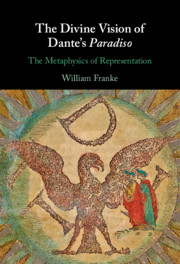Book contents
- The Divine Vision of Dante’s Paradiso
- The Divine Vision of Dante’s Paradiso
- Copyright page
- Contents
- Figures
- Prologue
- Acknowledgments
- Note on Translations and Primary Source Editions
- Part I The Literary Vision
- Part II Philosophical Reflections
- Excursus I Writing and Visionary Immediacy: Mechanics and Mysticism of the Letter
- Excursus II Saussure and the Structuralist Idea of Language as a System of Differences
- Excursus III Temporalization and Transcendence of Time through Language
- Excursus IV Transcendental Reflection: Time Synthesis and the Role of the “I”
- Excursus V Unmanifest Wholeness of Sense: Language as Image of the Imageless
- Excursus VI Transcendentality of Language and the Language of the Other
- Appendix Paradiso XVIII. 70–136
- Index
Excursus VI - Transcendentality of Language and the Language of the Other
from Part II - Philosophical Reflections
Published online by Cambridge University Press: 26 August 2021
- The Divine Vision of Dante’s Paradiso
- The Divine Vision of Dante’s Paradiso
- Copyright page
- Contents
- Figures
- Prologue
- Acknowledgments
- Note on Translations and Primary Source Editions
- Part I The Literary Vision
- Part II Philosophical Reflections
- Excursus I Writing and Visionary Immediacy: Mechanics and Mysticism of the Letter
- Excursus II Saussure and the Structuralist Idea of Language as a System of Differences
- Excursus III Temporalization and Transcendence of Time through Language
- Excursus IV Transcendental Reflection: Time Synthesis and the Role of the “I”
- Excursus V Unmanifest Wholeness of Sense: Language as Image of the Imageless
- Excursus VI Transcendentality of Language and the Language of the Other
- Appendix Paradiso XVIII. 70–136
- Index
Summary
The entering into a gathering that discloses time and everything temporal and historical occurs through a submitting to determination by history rather than by turning away from it towards supposedly eternal ideals. Dante’s poem, even in its affirmation of theological transcendence, is remarkable for its showing of language in its emergence in and from historical realities. Dante’s thematization and dramatization of language and its component letters lends itself to suggesting a probe that scrutinizes the sense of language as such. Language speaks to him in the Heaven of Jove directly; it becomes not just an instrument or means, but also in itself immediately a revelation. Heidegger’s philosophy, similarly, culminated in an attunement to what language itself says, for “language speaks” (“die Sprache spricht”). It speaks in the connectedness and disclosedness of things in a world, their lying-together-before us, which is not produced by human activity or techné, but is discovered as unaccountably given. Hence also the astoundingly organized order of the letters that Dante sees spontaneously sparking – as if contingently – into recognizable and even portentous shapes. Language, deeply considered, is the imperative presence of the Other facing us with its ethical demands. The imperative here is justice – the ethical imperative vis-à-vis the Other. Like Levinas, Dante represents language – when it is displayed to him directly as divine revelation in the heaven of Jove – as a revelation of Justice. Levinas’s ethical injunction is already revealed to him in the form of a peremptory imperative: “Love justice.”
Keywords
- Type
- Chapter
- Information
- The Divine Vision of Dante's ParadisoThe Metaphysics of Representation, pp. 262 - 285Publisher: Cambridge University PressPrint publication year: 2021

